“Arms Suitable to their condition”.
Maitland on the Revolution of 1688.
The Constitutional History of England.
Cambridge University Press 1909.
“Let us now recount the limitations which are set in this country to the development of what can properly be called a feudal system.
(i) First and foremost, it never becomes law that there is no political bond between men save the bond of tenure. William himself seems to have seen the danger. We read that in 1086 he came to Salisbury, *and there came to him his witan and all the landowning men that were worth aught from over all England, whosesoever men they were, and all bowed themselves down to him and became his men, and swore oaths of fealty to him that they would be faithful to him against all other men.' He exacted an oath of fealty not merely from his own tenants, but from all the possessors of land, no matter whose men they were; they were to be faithful to him against all other men, even against their lords.
This became fundamental law: we have before this seen its result; whenever homage or fealty was done to any mesne lord, the tenant expressly saved the faith that he owed to his lord the king. The oath of allegiance we find is exacted from all men; this exaction becomes part of the regular business of the local courts.
(2) English law never recognizes that any man is bound to fight against his lord. The sub-tenant who holds by military service is bound by his tenure to fight for the king; he is bound to follow his lord's banner, but only in the national army:—he is in nowise bound to espouse his lord's quarrels, least of all his quarrels with the king. Private war never becomes legal; it is a crime and a breach of the peace. Certainly, there was a great deal of private war; certainly men felt it their duty to follow their lord against his enemies, even
^ Select Chartersy p. 163. M. II
against the king; but this duty never succeeds in getting itself acknowledged as a legal duty. If that seems to you too natural to be worth mentioning, you should look at the history of France; there it was definitely regarded as law that in a just quarrel the vassal must follow his immediate lord, even against the king.
(3) Though the military tenures supply the king with an army, it never becomes law that those who are not bound by tenure need not fight. The old national force, officered by the sheriffs, does not cease to exist. Rufus had called it out for compulsory service; more than once it was called out against the Scots; in 1181 Henry II reorganized it by his Assize of Arms; it was reorganized again under Edward I by the Statute of Winchester in 1285 ; it is the militia of later days. Every man is bound to have arms suitable to his degree, down to the man who need but have bow and arrows. In this organization of the common folk under royal officers, there is all along a counterpoise to the military system of feudalism, and it serves the king well. The great families of the Conquest are at length pulverized between the hammer of the king and the anvil of the people…”.
Note: Page numbers are not included because they vary according to the programme that it being used to view the text. The reader before relying on this information should take steps to verify it by cross checking with other sources.

No comments:
Post a Comment